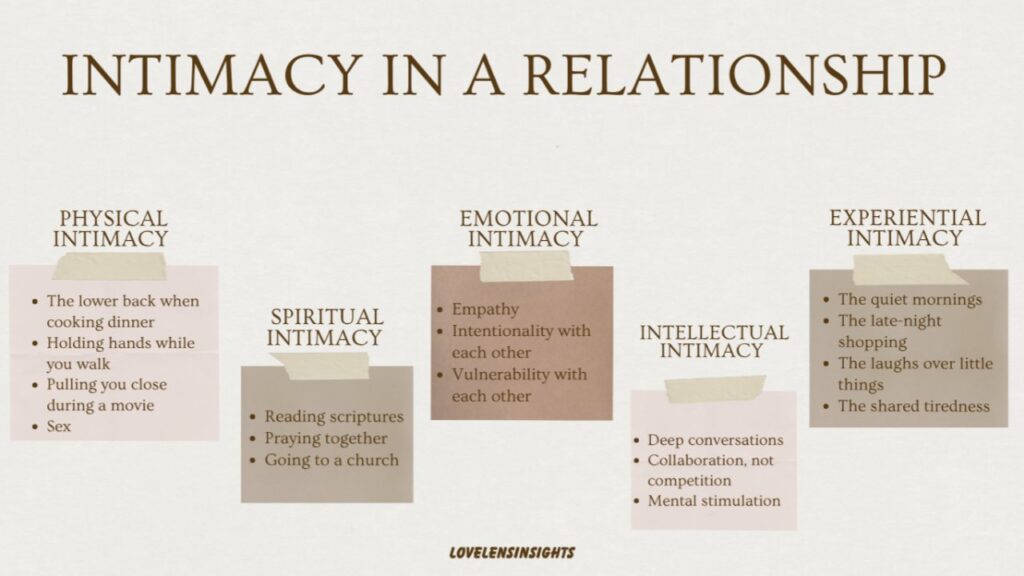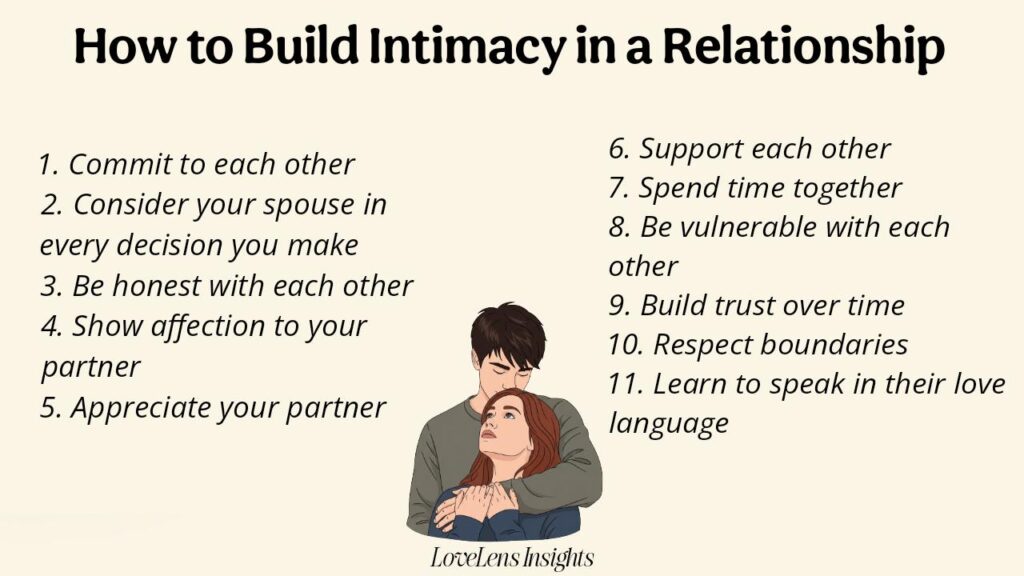Many people enter relationships expecting closeness and connection, but find themselves feeling distant, misunderstood, or alone, even with a partner by their side. That’s because there’s no intimacy in their relationships.
Whether it’s a lack of trust, unresolved conflicts, or just the daily grind pulling you apart, the absence of true intimacy can leave relationships feeling empty and unfulfilling.
If you’ve ever wondered why your bond feels flat or how to break through emotional walls to truly connect, you’re not alone.
This article explores what intimacy in relationships mean, why it matters, and how you can build it intentionally to create a deeper, more meaningful connection that lasts. Let’s get started.
Intimacy in a relationship is the deep closeness and connection between two people, where they feel safe, valued, and truly known by each other. It’s a connection that allows partners to share their inner thoughts, emotions, fears, and desires without fear of judgment or rejection.
John Gottman, PhD, a renowned relationship researcher, says, “Intimacy is not just about physical closeness; it’s about feeling deeply understood and emotionally connected.”
While sex can be an expression of intimacy, true intimacy goes far beyond physical connection. It’s possible to have sex without intimacy, and intimacy without sex.
Dr. Laura Berman, a relationship therapist, opines that, “Sex is one way we express intimacy, but true intimacy is about being seen and accepted for who you are.”
A lack of intimacy can leave partners feeling disconnected and unfulfilled. Ultimately, intimacy is what transforms a relationship from simply being together into being deeply connected.
Intimacy is in various forms, each deepening closeness. Here are a few types of intimacy in a relationship:
Physical intimacy is the meaningful, consensual physical connections you share with your partner that make you feel seen and wanted by them.
It starts with the small stuff—hands on the lower back when cooking dinner, holding hands while you walk, pulling you close during a movie, or that five-second hug that absorbs all the stress in the world and makes you feel better.
They could engage in sexual interactions or give each other full attention during conversations — no phones or distractions. Just their presence, not performance.

Physical intimacy example: holding hands
It goes beyond sex, even though sex is a part of it. A physical connection with someone you’re comfortable with creates a calm, relaxing effect that alleviates loneliness and cultivates a feeling of closeness.
It’s one of the activities couples engage in to deepen their connection. For physical intimacy to work, couples must trust, be vulnerable, and feel comfortably safe and secure with each other.
No one would be physically intimate with someone knowing they could harm them or put them in danger.
Spiritual intimacy occurs when you share similar spiritual beliefs and values with each other. From the Christian point of view, it’s when you love and put God first, even above your spouse.
You mutually submit, respect, and observe God’s purpose in your life. Your religious belief is in something greater than yourself, and you make decisions based on that perspective.
The beauty of spiritual intimacy is that it helps you to become the best version of yourself. This goes beyond religious practices such as going to church, reading scriptures, or praying together.
Since you practice the Word, not just read or hear, you learn to love your partner from a godly perspective, considering them first in every decision you make and taking into account how that decision affects their well-being.
This will not only deepen your connection but also help you to love your partner correctly.
On the other hand, if your spiritual values and interests don’t align, you could experience difficulties when handling specific issues in your lives.
For instance, if you’re the type that runs to God whenever you have a problem and your partner takes it out on alcohol, you will definitely contrast when handling problems in life.
If you make decision A, they could make decision B, making you feel disrespected and unloved.
Emotional intimacy is the heart connection, that is, the part that goes beyond physical touch, beyond date nights, and even beyond saying “I love you.”
It’s when both partners feel completely safe to be emotionally naked with each other. It’s about being able to say, “This is who I am (flaws, fears, messiness, and all), and I trust you to love me still.” And then hearing “I see you, and I’m not going anywhere.” This is it!
You feel emotionally held, not just physically touched. It comes from words like “I get it” or “You don’t have to go through this alone.”

It’s that closeness that goes beyond surface-level affection. When more emotional intimacy is present, both partners feel safe expressing their inner world, their feelings, fears, dreams, disappointments, and insecurities without the fear of being judged, dismissed, or misunderstood.
Building emotional intimacy takes intentionality, growing through consistent honesty, empathy, and emotional presence. Where emotional intimacy is strong, communication flows more freely, not just as daily routines or plans, but about how each person is genuinely feeling.
Partners become synced to each other’s moods and emotional needs. You begin to notice the subtle shifts in energy, and you care enough to ask what’s going on beneath the surface. It’s a special kind of bond that results in non-sexual intimacy.
It’s not about fixing each other, but about offering a safe space for one another to be vulnerable and real.
Think of it like two minds sitting at the same table, not trying to outtalk each other, but trying to understand the world and each other more clearly.
It’s the kind of dialogue that creates respect. It says, “I value how you think,” and even more, “I want to understand what shaped your thinking.”
Intellectual intimacy is about being able to discuss ideas with your partner. You might discuss beliefs, opinions, dreams, social issues, books, or experiences life throws at you.
It may also involve some deep questions you ask the other party. As a result, you have intelligent conversations that help you learn better.
You don’t have to agree on everything. In fact, the beauty of intellectual intimacy is that disagreement doesn’t feel like a threat; it feels like an opportunity to go deeper. You’re not competing, you’re collaborating.

View it as the meeting of minds and connect perspectives. They can talk about differences with honesty and care, without attacking or withdrawing, and grow closer instead of apart.
They start to understand why the other person thinks the way they do, and sometimes that understanding builds more connection than agreement ever could.
The space where thoughts are not just exchanged but respected, challenged, and explored with curiosity and care. It invites both partners to bring their thoughts to the romantic relationship, not to prove each other wrong or right, but to grow together in understanding and insight.
The word ‘experiential’ is derived from experience, and it points to intimacy that is built through shared moments, activities, and life events.
It’s about doing life together, not just side by side, but in sync, where the doing becomes meaningful because it’s shared.
What makes this kind of intimacy special is that it’s less about words and more about presence. It speaks to the soul of togetherness, “We’ve lived through things together. We’ve shown up. We’ve shared space, time, and stories.” The beauty of it.
It’s the type of intimacy that develops when you build memories. The ordinary moments that no one else sees, the quiet mornings, the late-night shopping, the laughs over little things, the teamwork during chaos, the shared tiredness after a long day.
These are not always glamorous, but they are sacred. Because each time you go through life with your partner, even in small ways, you deepen the sense of “us.”
It reminds you that love isn’t just about how you feel or what you think, it’s also about how you live, side by side, day by day.
So, whether it’s building a home, parenting together, volunteering, dancing in the kitchen, or binge-watching a show you both secretly love, these shared slices of life quietly, steadily strengthen the bond between two people. They create a relationship that’s not just felt or understood, but lived.
Intimacy offers different benefits. Some of which include:
When intimacy flourishes in romantic relationships, it lays a strong foundation for trust to grow. Sharing vulnerabilities, fears, and dreams creates a safe space where partners feel seen, understood, and accepted for who they truly are.
This openness fosters a deep sense of security, knowing that they can rely on each other through thick and thin. As trust deepens, partners become more willing to be honest and transparent, further strengthening the bond between them.
For instance, they could engage in intimacy exercises to understand each other and create a cycle of mutual respect. This further allows each person feels confident that their partner has their best interests at heart.
Intimacy isn’t just about romantic feelings; it’s a powerful contributor to mental well-being. Feeling connected and supported by a loved one can significantly reduce stress, anxiety, and feelings of loneliness.
Sharing your inner world with someone who cares can provide a sense of validation and acceptance, boosting self-esteem and overall emotional health.
Furthermore, a lack of intimacy can lead to feelings of isolation and depression. The presence of a supportive partner offers a buffer against life’s challenges, providing a sense of belonging and purpose that promotes psychological resilience.
While not the sole component, intimacy plays a pivotal role in fueling sexual desire within a relationship. Emotional and intellectual connections often enhance physical attraction, creating a deeper sense of longing and passion.
Feeling understood and cherished by your partner can ignite a fire that goes beyond mere physical attraction.
Open communication and a willingness to explore each other’s desires are essential aspects of sexual intimacy. When partners feel safe and comfortable expressing their needs and fantasies, it can lead to a more fulfilling and adventurous sex life.
Intimacy fosters contentment and satisfaction within a relationship. Instead of the fear of intimacy, partners feel connected on multiple levels, emotionally, physically, intellectually, and spiritually.
They experience a deep sense of fulfillment and happiness, creating a strong foundation for long-term commitment and stability.

A romantic relationship built on intimacy is more likely to withstand the inevitable challenges and changes that life throws its way.
Partners who are deeply connected are better equipped to implement effective conflict resolution strategies in their relationship, support each other’s growth, and maintain a loving and supportive environment.
The benefits of intimacy extend beyond the emotional aspect and can positively impact physical well-being by lowering blood pressure, boosting the immune system, and even extending lifespan.
The release of feel-good hormones like oxytocin during intimate moments can have a calming and restorative effect on the body.
Moreover, intimate relationships often encourage healthier lifestyle choices. Partners may be more motivated to exercise, eat well, and take care of themselves when they feel supported and loved.
This synergy creates a cycle that promotes overall well-being for both individuals.
Building intimacy in a healthy relationship is a continuous process that requires dedication, effort, and a willingness to connect on a deeper level. Here’s how to nurture a deeper connection:

A foundation of unwavering commitment sets the stage for intimacy to flourish. Making a conscious decision to prioritize their personal relationships, even amidst life’s inevitable challenges, creates a sense of security and trust.
For instance, in our LoveLens story series, Lanre made up his mind that he would marry her the the moment he saw her. That’s commitment
Also, commitment extends beyond simply staying together; it involves actively investing in the relationship’s growth and well-being.
For instance, talking to your partner every day is a sign you want to commit to them. Showing up for each other, celebrating successes, and offering unwavering support during difficult times are other examples.
True partnership involves considering the impact of your decisions on your spouse. This doesn’t mean sacrificing your own needs and desires, but rather approaching choices with a collaborative mindset.
Discuss important matters openly, taking into account your partner’s perspective, feelings, and long-term goals. This demonstrates respect, strengthening the bond between you.
Honesty is the foundation of every true intimate relationship. Open and transparent communication, even when it’s difficult, builds trust and creates a genuine connection. Share your thoughts, feelings, and experiences openly, without fear of judgment or rejection.
When honesty falters, it weakens the bond of intimacy and creates distance between romantic partners.
Affection is a tangible expression of love and care that nourishes the emotional connection between partners. These gestures can be as simple as a warm hug, a loving touch, or a thoughtful note.
Consistent displays of physical affection, even outside of sexual intimacy, help to reinforce feelings of being cherished and desired.
Expressing gratitude and appreciation for your partner’s efforts and qualities is essential for maintaining a positive and loving atmosphere.
Acknowledge your romantic partner’s contributions to the relationship, both big and small. Regularly voicing your appreciation makes your partner feel valued and strengthens their sense of worth.
Being a source of unwavering support is a hallmark of an intimate relationship. Encourage your partner’s dreams and aspirations, and offer practical assistance when they need it.
Celebrate their successes and provide comfort and encouragement during setbacks. Knowing that you have each other’s backs creates a powerful sense of security and togetherness.
Quality time is essential for nurturing intimacy and creating shared memories. Make a conscious effort to carve out dedicated time for each other, free from distractions.
Engage in activities that you both enjoy, whether it’s a quiet evening at home, an adventurous outing, or simply a meaningful conversation.
Vulnerability involves sharing your true self with your partner, including your fears, insecurities, and imperfections. This openness allows for a deeper level of connection and understanding.
While it can be scary to let your guard down, vulnerability is important for creating a safe space for authentic expression.
Trust is not built overnight; it’s developed over time through consistent actions and reliable behavior.
Be dependable, keep your promises, and honor your commitments. Demonstrate that you are trustworthy and that your partner can rely on you, no matter what.
Recognize and honor your partner’s personal space, values, and limits. Avoid crossing boundaries that could make them feel uncomfortable or disrespected.
Clear communication and mutual understanding of boundaries help in improving social and personal relationships with each other.
Understanding your partner’s love language, their preferred way of receiving love and affection, can greatly enhance intimacy.
Whether it’s words of affirmation, acts of service, receiving gifts, quality time, or physical touch, making an effort to express love in their preferred language will make them feel valued and understood.
Some questions aren’t mere questions. Intimate questions unveil the secrets, happenings, or silent cries your partner may be having. As a result, you implement solutions to promote the bond existing between both partners. In this section, we will explore ten intimate questions to ask your partner in a relationship.
Quotes are words of affirmations that can help to improve the bond in your relationships. Here are ten intimacy quotes you can use to strengthen connections.
Intimacy issues weaken the connection in a relationship, diminishing the sense of connection between partners.
Addressing these aspects directly can help rebuild emotional and physical closeness.
Given that 67% of relationships fail due to poor communication, it’s no surprise that it poses a significant barrier to intimacy.
Poor communication can manifest in different forms, such as avoiding difficult conversations, ghosting your partner, failing to express emotions, or not actively listening to one another.
Over time, this can lead to misunderstandings, resentment, and a feeling of being emotionally distant from each other.
A lack of effective communication prevents you and your partner from truly understanding each other’s needs and desires, making it difficult to nurture a deep bond.
High levels of stress, whether stemming from work, finances, family obligations, or other sources, can significantly impact a relationship’s intimacy. Stress often leads to fatigue, irritability, and a decreased desire for physical and emotional connection.
When one or both partners are constantly overwhelmed, they may have less time and energy to invest in the relationship, causing a decline in closeness and affection.
Managing stress effectively is, therefore, important for maintaining a healthy and intimate relationship.
Sometimes, one or both partners might unconsciously resist closeness due to a deep-seated fear of intimacy. This fear can arise from past experiences, such as childhood trauma or previous relationship wounds, leading to anxieties about vulnerability, rejection, or dependence.
Individuals with a fear of intimacy may create emotional barriers, avoid deep conversations, or sabotage the relationship to maintain a safe distance.
When trust is broken, whether through infidelity, dishonesty, or other betrayals, it can be incredibly difficult to restore.
A lack of trust creates a sense of insecurity and vulnerability, making it challenging for partners to open up and be emotionally available to each other.
Rebuilding trust requires time, consistent effort, transparency, and a willingness to forgive and move forward. Without trust, intimacy cannot flourish.
Physical or mental health problems can also significantly affect intimacy.
Chronic pain, illness, or mental health conditions like depression or anxiety can impact a person’s energy levels, mood, and desire for physical and emotional connection.
These issues can create challenges for both partners, requiring understanding, empathy, and a willingness to adapt.
Seeking appropriate medical or therapeutic help is important for managing health issues and preserving closeness in the relationship.
Here are some key points to remember about intimacy in relationships:
Intimacy to a man means feeling emotionally safe and valued. It involves trust, vulnerability, respect and affection. It’s not just physical gestures but also emotional connection; being listened to, supported, and trusted without fear of judgment.
For a woman, intimacy often means feeling emotionally connected, seen, and understood, creating a natural physical closeness. It’s built on trust, safety, shared vulnerability, and constant expressions of care.
Improving intimacy involves open and honest communication, spending quality time together, practicing active listening, showing affection, being vulnerable, and exploring new experiences as a couple. Small gestures and consistent effort can make a big difference.
An example of intimacy in a relationship could be sharing personal fears and dreams, engaging in deep conversations, holding each other closely, or simply enjoying comfortable silence while feeling connected.
While relationships can exist without intimacy, they may lack depth, emotional fulfillment, and long-term satisfaction. Intimacy is essential for a strong and lasting bond.


